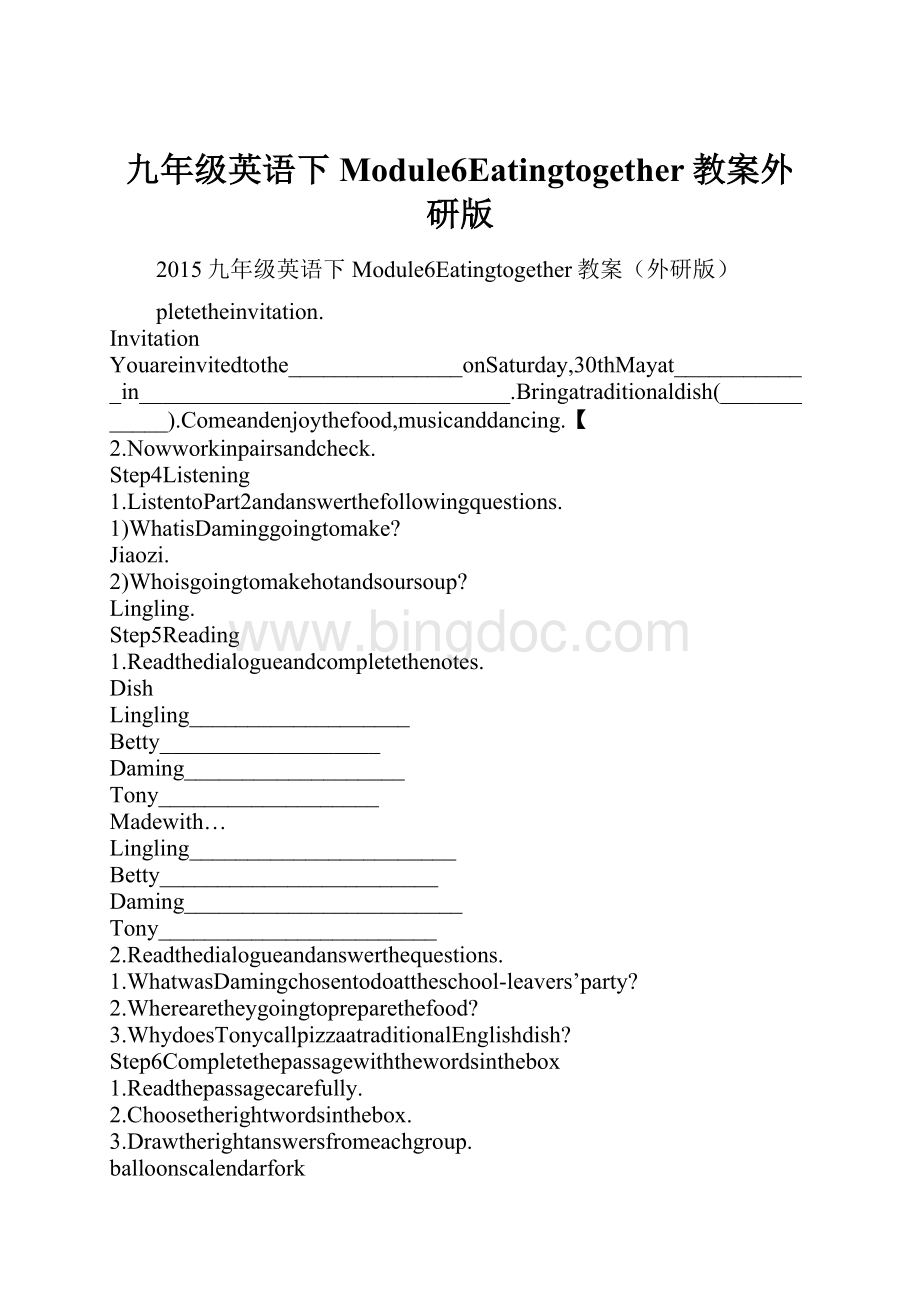九年级英语下Module6Eatingtogether教案外研版.docx
《九年级英语下Module6Eatingtogether教案外研版.docx》由会员分享,可在线阅读,更多相关《九年级英语下Module6Eatingtogether教案外研版.docx(13页珍藏版)》请在冰点文库上搜索。

九年级英语下Module6Eatingtogether教案外研版
2015九年级英语下Module6Eatingtogether教案(外研版)
pletetheinvitation.
Invitation
Youareinvitedtothe_______________onSaturday,30thMayat____________in________________________________.Bringatraditionaldish(____________).Comeandenjoythefood,musicanddancing.【
2.Nowworkinpairsandcheck.
Step4Listening
1.ListentoPart2andanswerthefollowingquestions.
1)WhatisDaminggoingtomake?
Jiaozi.
2)Whoisgoingtomakehotandsoursoup?
Lingling.
Step5Reading
1.Readthedialogueandcompletethenotes.
Dish
Lingling___________________
Betty___________________
Daming___________________
Tony___________________
Madewith…
Lingling_______________________
Betty________________________
Daming________________________
Tony________________________
2.Readthedialogueandanswerthequestions.
1.WhatwasDamingchosentodoattheschool-leavers’party?
2.Wherearetheygoingtopreparethefood?
3.WhydoesTonycallpizzaatraditionalEnglishdish?
Step6Completethepassagewiththewordsinthebox
1.Readthepassagecarefully.
2.Choosetherightwordsinthebox.
3.Drawtherightanswersfromeachgroup.
balloonscalendarfork
knifepaintspoon
Thedayfortheschool-leavers’partyisanimportantdateintheschool
(1)_________.Tonyisgoingtobringsome
(2)_________and(3)______________somepicturesfortheparty.Everyoneisgoingtobringatraditionaldishthatcanbeeatenwiththeirfingers.Soupisnogoodbecauseitisnotfingerfoodandpeopleneeda(4)_______forit.Anythingthatneedsa(5)_______and(6)_______isnotfingerfoodeither.
Step7EverydayEnglish
LetSssaywhattheyhavelearntinthepassage.
•Soup’snogoodthen.
•Andyou?
•Iseewhatyoumean.
Step8Languagepoints
SsshouldmasterthemainpointsfromthepassageinPart3.Ifpossible,letthestudentstosayatfirst.
1.Lookattheschoolcalendar!
看看学校的校历!
calendar表示“日历”,schoolcalendar表示“校历”。
e.g.Lookattheschoolcalendar!
Wewillhaveanexamnextweek.
看看学校的校历!
我们下周将有一次考试。
2.We’reallinvited.
我们都被邀请了。
这个句子为一般现在时的被动语态。
invite是动词,表示“邀请”。
invitation是名词,也表示“邀请”。
3.AndIwasaskedtobringsomeballoonsandpaintsomepicturesfortheparty.
我被要求带一些气球和为这个聚会画一些画。
balloon表示“气球”。
paint表示“绘画”,是动词。
e.g.Pleasepaintaballoonformeinthepaper.
请为我在纸上画一个气球。
4.Wecanheatitupintheschoolkitchen.
我们能在学校厨房加热它。
heatup表示“使变热,给…加热”。
e.g.Lightthecookerandheatupthefood.
点着厨具加热食物。
5.Theteachershaveaskedeveryonetoprepareatraditionaldishfromtheir
homecountry.
老师要求每人准备一道家乡的传统菜。
dish表示“烹制好的菜肴,一道菜”。
e.g.WhenIwasinItaly,Ihadawonderfulpastadish.
我在意大利的时候,吃过一次很棒的意大利面。
dish还表示“盘子”。
Dish的复数还可以表示“待洗的餐具”。
e.g.I’lldothedishesbeforewego.
我们走之前,我会把餐具洗好的。
6.Oh,soup’snogoodthen.
哦,汤不行。
nogood表示“不适合”。
e.g.Theseglassesarenogoodforchampagne.
这些玻璃杯不适合用来喝香槟。
nogood的用法有四条:
(1)itisnogooddoing做某事没用
e.g.It’snogoodtalkingtohim—heneverlistens.
跟他讲没用,他从来不听。
(2)nogoodforsth.不适合某物/某事
e.g.Thismedicineisnogoodforheadache.
这药治不了头痛。
(3)nogoodtosb.对某人没有好处或没有帮助
e.g.Acarisnogoodforme,sinceIcan’tdrive.2
汽车对我没用,因为我不会开车。
(4)donogood没用处,不成功
e.g.I’lltalktohim,butitwilldonogood.
我会和他谈的,但不会有用。
7.Thatmeansyoueatitwithyourfingers,notwithaknife,forkorspoon.
那意味着你吃饭用你的手指,不会用刀、叉、勺子。
knife表示“餐刀”,复数为knives.
fork表示“餐叉”。
spoon表示“匙”。
aknifeandfork表示“一副刀叉”。
8.Issheinvitedtotheschool-leavers’partytoo?
她也被邀请参加学校的毕业晚会了吗?
beinvitedtodosth.表示“被邀请去做某事”。
e.g.Iwasinvitedtohisbirthdayparty.
我被邀请去参加他的生日聚会。
Step9Learningtolearn
LetSslearnabouthowtocommunicatewithforeignpeople.
YoucanuseEnglishtocommunicatewithpeoplefromallovertheworld–takeyourchancetolearnsomethingabouthowtheyliveandwhattheyeat.Learningaboutotherculturesisnotonlyinteresting,itwillalsohelpyouunderstandtheworldbetter.
Step10Pronunciationandspeaking
1.Readandmarkthepauses.
Lingling:
Canwecookitatschool?
Betty:
Wecanheatitupintheschoolkitchen,butitshouldbecookedathome.Whatareyougoingtomake?
2.Nowlistenandcheckifit’sright.
Lingling:
Canwecookitatschool?
Betty:
Wecanheatitupintheschoolkitchen,butitshouldbecookedathome.Whatareyougoingtomake?
3.Workinpairs.ReadtheconversationinActivity5aloud.
Lingling:
Canwecookitatschool?
Betty:
Wecanheatitupintheschoolkitchen,butitshouldbecookedathome.Whatareyougoingtomake?
4.Workinpairs.Makeplansforaparty.Thinkabout:
foodanddrink,musicanddancing
●foodanddrink
●musicanddancing
5.Workinanotherpair.Talkaboutyourpartyplans.
–What’syourplanfortheparty?
–Everyonewillbeaskedtobringsomethingtoeat…
Step11Exercises
Letstudentsdomoreexercisestomasterthelanguagepoints.
1.MrsLiboughta____forherdaughteranditmadeherveryhappy.
A.calendarB.balloonC.invitationD.fork
2.Peopleusuallyusecookerto_____thedishes.
A.goupB.heatupC.getupD.fixup
3.Hewassadbecausehewasn’t______gotohisclassmate’sparty.
A.InviteB.beinvitedC.beinvitedtoD.invitedto
4.Thebookisnogood____thelittlechildren.
A.withB.atC.forD.about
答案:
1.B2.B3.D4.C
Step12Homework
如果你下周日过生日,请用英语给你的朋友写一封邀请函,希望他们能够参加你的生日聚会。
Unit2KnivesandforksareusedformostWesternfood.
【教学目标】
Knowledgeobjective
Keyvocabulary—Westerner,West,serve,similar,wing,lady,gentleman,cross
Keystructures—helpyourself,doastheRomansdo
Abilityobjective
TogetinformationaboutWesterndietculture.
Tomasterthepassivevoice.
Moralobjective
TorespectWesterndietculture;TobeproudofourownChinesedietculture.
【教学重点】
1.Tolearnsomeexpressionsinthepassage.
2.Tolearnthepassivevoice.
【教学难点】
1.Togetinformationfromthearticle.
2.TheuseofdoastheRomansdoandhelponeself.
【教学方法】
PWPmethod,task-basedmethod
【教学手段】
Ataperecorder,multimediaandsomepictures
【教学过程】
TeachingProcedures:
Step1Warmingup
1.LookatthepicturesandtalkaboutChinesedietculture.
2.LookatthephotoofaWesternmeal.TalkaboutthedifferencesbetweenaWesternmealandaChinesemeal.
Step2Presentation
Learnsomenewwords.
Step3Reading
1.Listenandreadthepassage,thenanswerthequestions.
1)Whoisthepassagewrittenfor?
2)Wheremightyouseeapassagelikethis?
2.FinishActivity3:
Completethetablewiththeinformationfromthepassage.
3.FinishActivity4:
Readthepassageagainandanswerthequestions.
1)“SowhenyoueatWesternfood,doasWesternersdo.”Sowhatshouldyoudo?
2)“Atthestartofameal,theFrenchsay‘Bonappetit’.”WhatdoyousayatthestartofaChinesemeal?
3)“I’msorry.Idon’teatmeat.”Whenmightyouwanttosaythis?
4)“No,thanks.Itwasdelicious,butI’vehadenough.”Doyoumeanyoudonotlikethefood?
5)“Itissometimesdifficulttoknowwhenthemealisover.”Howdoyouknowthat
amealisoverinChina?
Keys:
1)Weshouldwatchwhatotherpeopledoandcopythem.
2)Wesay“Chiba!
”atthestartofnormalmealsor“Dajiachihao!
”atthestartofmoreformalmeals.
3)IfIamofferedsomethingwhichIdonotlike.
4)No,itmeans“IlikethefoodbutI’mfull.”
5)InChina,amealisusuallyoverwhenthefoodisfinished.
4.ReadthepassageinActivity2again.Decidewhichpartissurprising,interestingorunusualtoyou.
Step4Languagepoints
1.Weoftensay,“WheninRome,doastheRomansdo.”
我们常说:
“入乡随俗”。
WheninRome,doastheRomansdo是一个西方谚语,相当于汉语中的“入乡随俗”。
其中,
as表示“和……一样(指以同样的方式处理某事物)”。
e.g.Whileinthechemistrylab,doasIsay,please.
其它的西方谚语有:
Likefather,likeson.有其父必有其子。
Nopain,nogain.没有耕耘,就没有收获。
Oncebitten,twiceshy.一朝被蛇咬十年怕井绳。
Loveme,lovemydog.爱屋及乌。
2.Dinnerisservedaround7pmorevenlater.
servev.端上(食物和饮料),服侍……进餐
常用结构:
servesb.sth./servesth.tosb.
e.g.Theyusuallyserveteaatthree.
Thewaiterserveduswine.
3.ButthereisnothingsimilartosayinEnglish.
similaradj.相似的
可用作定语或表语
besimilarto意为“与……相似”。
e.g.Martin’sshoesaresimilartomine.
besimilarin表示“在某方面相似”。
e.g.Thetwohousesaresimilarinshape.
4.Helpyourself.
随便做(或用)吧;请自便
是主人招待客人的常用语。
e.g.Helpyourselftosomefish,mydearfriend.
5.Noonewillbecross.没有人会生气的。
crossadj.生气的
e.g.Theoldladywasreallycrosswhentheboy’sballbrokeherwindows.
Allright,youtwo,don’tbecrosswitheachother.
v.横穿,穿过;交叉
e.g.Ittookhimtwomonthstocrossthedesert.
Shewassittingonthefloorwithherlegscrossed.
Step5Practice
FinishActivity6:
Completethepassagewiththecorrectformofthewordsinthebox.
gentlemanknifeladyservewing
DuringamealintheWest,youuse
(1)_____andforksmostofthetime,althoughyoucanuseyourfingerstoeatchicken
(2)______orhamburgers.Youwillbeinvitedto(3)_____yourselfwithfood,the(4)______beforethe(5)_________.
Keys:
knives,wings,serve,ladies,gentlemen
Step6Writing
WriteapassageaboutChineseeatingcustomsforatouristmagazinewithWesternreaders.
Unit3Languageinuse
【教学目标】
Knowledgeobjective
Getthestudentstobeabletousethekeyvocabularyandnewwordstheylearninthisunit.
Abilityobjective
Tosummarizeandconsolidatethepassivevoice.
Moralobjective
Toinviteotherstojoinyourbirthdaypartyandtoenjoythehappiness.
【教学重点】
Tobeabletowritewiththepassivevoice.
【教学难点】
Throughlistening,speakingandwriting,letstudentspractisethepassivevoice.
【教学方法】
PWPmethod,task-basedmethod
【教学手段】
Ataperecorder,multimediaandsomepictures
【教学过程】
TeachingProcedures:
Step1Revisionandlead-in
LetSslookatthepicturesandanswerthequestionstoreviewwhattheyhavelearnt.
What’syourfavouritefood?
Isthereanyfoodyoudon’teatatall?
Doyoulikeeatingmeat?
Doyoulikehavingjiaozi?
Whatkindofjiaozidoyoulike?
Step2Languagepractice
AskSstofinishthesentencestomasterthestructureofthepassivevoice.2
1.I__________toplaythedancemusic.
2.Lunch___usually_______atabout1pm.
3.Knivesandforks_________formostWesternfood.
4.You_____________bysomeonewhoasks,“Wouldyoulikesome…?
”
Keys:
waschoseniseatenareusedwillbeserved
Step3Grammar
英语中有两种语态:
主动语态和被动语态。
主动语态表示主语是动作的执行者,被动语态表示主语是动作的承受者。
如:
Wecleantheclassroomeveryday.(主动语态,主语we是clean这一动作的执行者)
Theclassroomiscleanedeveryday.(被动语态,主语theclassroom是clean这一动作的承受者)
使用被动语态的情况:
1)不知道或没有必要知道动作的执行者时
e.g.Englishisspokenallovertheworld.
2)强调或侧重动作的承受者时
e.g.Thisdictionaryisusedbymoststudents.
时态构成例句
一般现在时am/is/are+动词过去分词KnivesandforksareusedformostWesternfood.
一般过去时was/were+动词过去分词TheplaywasperformedbytheBeijingEnglishTheatreCompany.
一般将来时begoingto/willbe+动词过去分词Youaregoingto/willbeinvitedtoabigmeal.
除时态以外,还应该注意短语动词在被动语态中的用法。
e.g.OldpeoplearetakengoodcareofinChina.在中国,老年人得到很好的照顾。
Anoticewillbeputuponthewall.墙上会贴出一个告示。
可以看出,takecareof,putup等短语动词的被动语态与单个动词的被动语态构成方式相同。
Step4Completetheexplanationsofthesigns
1.LetSsreadthesignsfirst.
LUNCHSERVEDDAILYFROM12PMTO2PM
Don’ttakefoodintothemeetingrooms
Parkopenforpicnics
Dogsnotallowed
Closeduntil10am
2.LetSsfillintheblankswiththerightwords.
1)Lunc